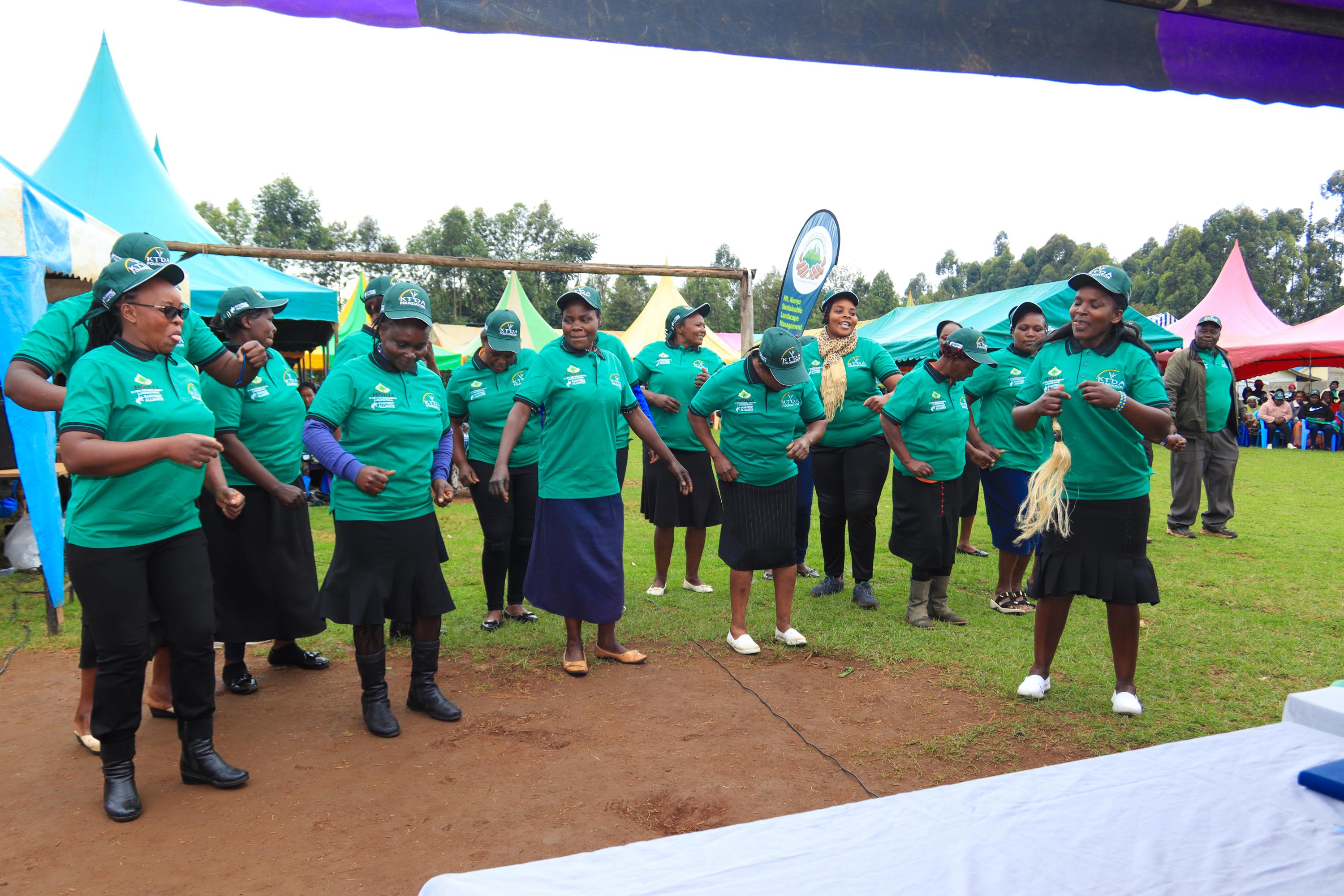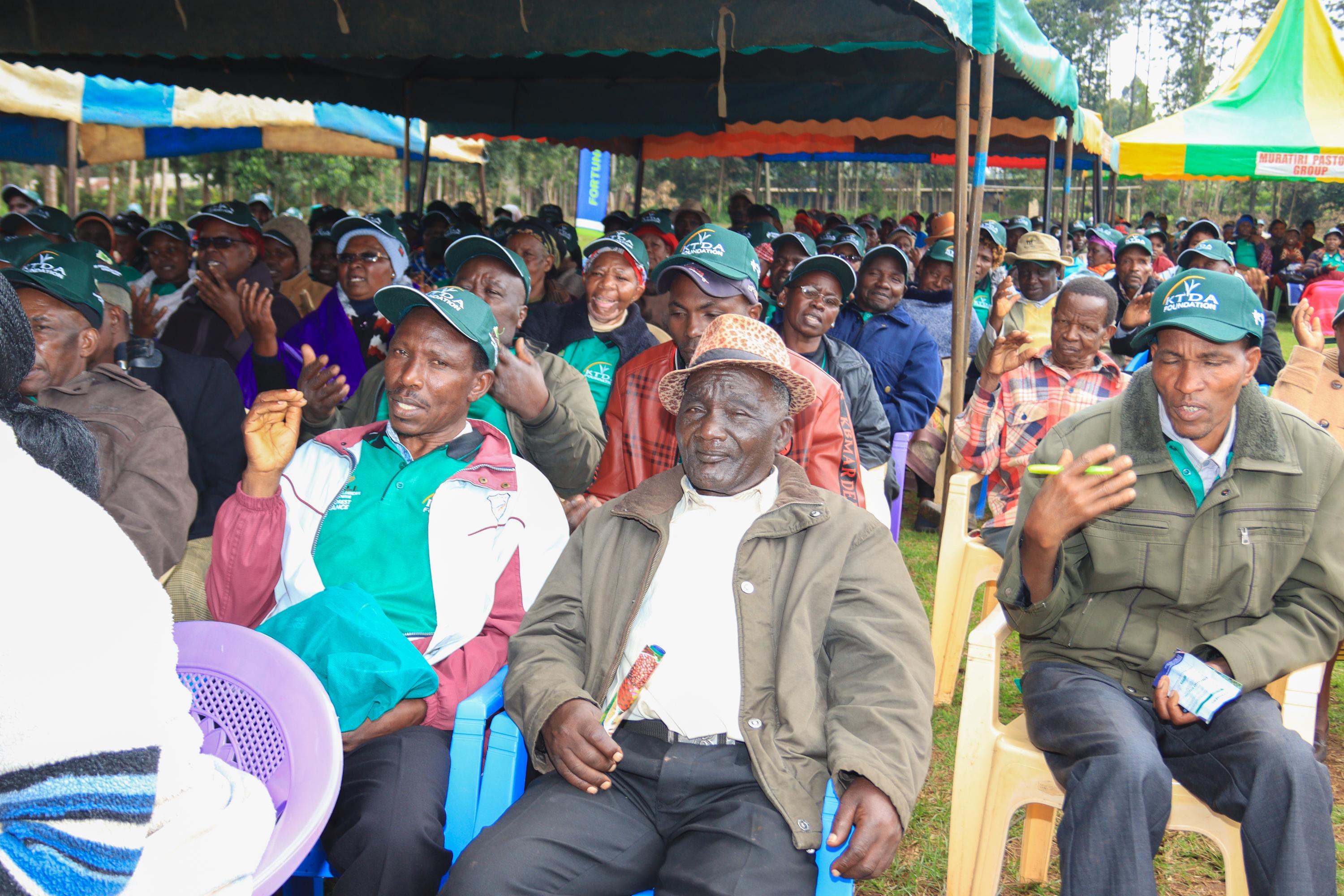
 Kimunye tea farmers entertain guests during their graduation ceremony following a six months training on August 20, 2025.
Kimunye tea farmers entertain guests during their graduation ceremony following a six months training on August 20, 2025.More than 900 tea farmers from Kimunye tea factory in Kirinyaga county have benefited from a six-month training aimed at improving their returns.
The training centred on crop diversification, land management and improvement of their livelihoods through climate-smart and regenerative agriculture.
The training was undertaken through Mt Kenya Sustainable Landscape and Livelihoods (MSULLI) programme that is facilitated by Rainforest Alliance in partnership with KTDA Foundation and Kimunye Tea Factory.
The initiative that was started in 2020 aims at empowering more than 50,000 smallholder coffee and tea farmers in the region, with the partnership of coffee co-operative societies, tea factories, county governments and community-based organisations.
Speaking during a graduation ceremony at Nyagithuci Primary School in Gichugu on Wednesday, Rainforest Alliance’s representative Susan Kinyua underscored the need for farmers to have several streams of income to uplift their economic statuses.
“We have trained them on how to invest in various cash crops and embrace organic farming as well as establishing small enterprises to complement their income,” she said.
Farmers were also trained on proper land management and transitioning from conventional farming to climate-smart and regenerative agriculture.
Kinyua said many smallholder farmers struggle to keep records and establish how much profits they make from their hard work, making it difficult for them to plan for the future.
“Bookkeeping is an integral part of agri-business and no business can thrive without concise documentation. The plan is to empower farmers to engage in farming as a commercial practice and not just as a way of life,” she added.
 Tea farmers from Kimunye tea factory in Kirinyaga county during a graduation ceremony
Tea farmers from Kimunye tea factory in Kirinyaga county during a graduation ceremonyThe programme, Kinyua said, covers Kirinyaga and Embu counties and has greatly impacted environmental conservation in areas surrounding Mt Kenya forest through training of farmers on how to practice environmentally friendly farming and preservation of riparian areas.
She said the region serves as a critical water tower, supplying more than 75 per cent of the country’s renewable surface water and hosts more than 700 plant species and animals.
The mountain slopes, Kinyua added, sustains hundreds of thousands of smallholder farmers and that their livelihoods are increasingly threatened by climate change and rising costs of production.
“Land degradation through unsustainable farming practices also forces farmers to venture into the forests, which further worsens environmental conservation,” she said.
Kinyua said the programme helps mitigate against climate change while improving the livelihoods of farmers.
Allan Kinuthia, a KTDA Foundation official, said the programme also seeks to expand market access for farmers, confirming that more than 14,000 have so far undergone training.
Kinuthia observed that the combination of sustainable agriculture and environmental conservation directly impacts local economies as farmers realise more harvests.
Numerous farmers have since engaged in black soldier flies farming, apiculture, vertical farming and embraced green energy through the programme’s support.
Simon Ndambiri, a director at Kimunye tea factory, said farmers were also enlightened on the benefits of replacing their tea with newer varieties that are disease resistant and produce higher yields.
Tea farmer Juma Githinji hailed the training saying they can now better plan their farms through intercropping and mixed cropping to maximise the available farmland.
He said they were also implored to start kitchen gardens where they can organically grow vegetables to save money and keep their families healthy.
“These are lessons that we will put into practice to better our lives,” Githinji said, calling on more farmers to ensure they take advantage of the training opportunities to learn more on how to improve their farming.





![[PHOTOS] Kindiki leads economic empowerment forum in Wajir](/_next/image?url=https%3A%2F%2Fcdn.radioafrica.digital%2Fimage%2F2025%2F08%2F5a14de4c-c863-48bb-819d-36f1f26ae789.jpeg&w=3840&q=100)







